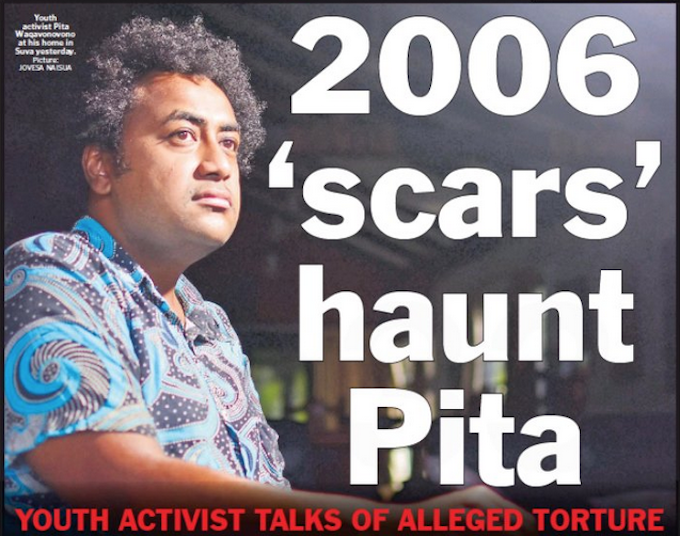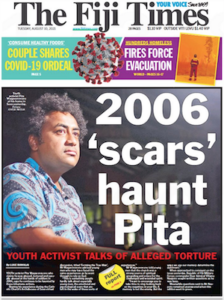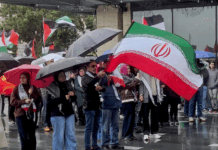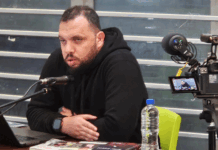
COMMENTARY: By Pita Waqavonovono in Suva
I thank The Fiji Times for covering this story. I also thank Archbishop Peter Chong for providing a space for men to talk about issues that affect them. My shared experience with thousands of other Fijians, an experience of torture and abuse – we only have our faith to turn to. Here is what happened to me after the 5 December 2006 military coup in Fiji.
It was Christmas Eve 2006, we had returned from Mass. The sermon, Christmas carols, the nativity play — and the reaffirmation of Christ’s presence among us! It was a beautiful service. I recall meeting [former Minister of Labour] Kenneth Zinck outside church. We wished each other a Merry Christmas!
I remember helping my late mum prepare for the next day’s cooking [because Mum cooked one day ahead] — I placed the corned beef on the stove and brought the pork out of the fridge to defrost — little did I know, that I wouldn’t eat any of it.
Around this time, I received a phone call, that the Republic of Fiji Military Forces (RFMF) were at my gate, it was around 11pm. My late stepfather, Ratu Timoci Vesikula, ran out and told off the men who came to take me.
- READ MORE: Fijian activist shares trauma of abuse — The Fiji Times
- Beating justice: How Fiji’s security forces get away with torture – Amnesty International
I recall him saying that this was too late in the night to be taking anyone to the military camp.
Eight solders with guns. I asked my stepdad to let me go, as I did not know what these men were capable of — since they were holding guns. When I got in the car, I saw my good friend [activist] Laisa Digitaki in the vehicle. We had a brief chat, before she was dropped off at a very dark QEB [Queen Elizabeth Barracks]. When I say dark, I mean they had turned off all the lights — that was strange to me.
I was ordered to stay in the vehicle and that I was to go and collect my cousin Jacque. I recall as I and Jacque conversed as we journeyed back to the camp, I realised both her and Laisa had canvas on. I had flip flops.
Christmas was fast approaching! And I’m not sure whether it was my idea or my cousins, but I started wishing all the officers along the checkpoints a Merry Christmas.
Friendly, then things changed
The two officers driving us to the camp, were friendly. When we reached the camp, things changed.
As we drove into the camp, there was silence in the car. The whole complex was blacked out, I recall the only light was from the vehicle that was carrying us. Weirdly as we exited the vehicle, the soldiers asked for our phone and wallet.
I didn’t have my phone on me, so I gave over my wallet that had some money in it — my wallet was returned the next day, without the contents.
The soldiers said “Waqavonovono” and they told me to run up to the Mess Hall. I stared at them, firstly because I didn’t know where the Mess Hall was and secondly, I didn’t understand why they were telling me to run anywhere.
Than they told us to run to the ground. As I jogged to the ground these same men followed me and they kept hitting me and swearing at me. I stopped and tried to catch a glimpse of their faces and I am sure that I gave one them a left hook, this was when I was violently knocked to the ground and kicked repeatedly.

I heard the voices of the then commander and the land force commander. I shielded my face as they all had a go at me.
They dragged me to the cricket pitch. Here I realised that there were other people lying on that pitch. They kept kicking and punching us, but what I didn’t understand was the stomping on our backs and the demand that we kiss their boots.
Refusal to kiss their boots
My refusal to kiss their boots, gave me more kicks!
As they attacked us, they kept referring to the [2006] coup and that they were trying to help Fiji, I was not helping them do their job effectively. I recall them asking someone near me, if she was pregnant — I am certain I heard a yes.
That’s when I heard her scream! I tried to stand up, but was pinned down and told to stay down.
A soldier knelt down and told me that I would be killed that night. I was told that my body would be dumped in the sea — no one would care. This same officer put a gun to my head and pressed it hard against my head. He said that I could be easily killed.
Around this time, was when I realised two things, the smell of alcohol from the officers and the fact that a separate group of officers were singing Christmas Carols.
I have never heard Christmas Carols sung in a such a circumstances. Disgusting! Shameful!
As we lay on the cricket pitch, I felt something heavy on my head. It was someone’s boot.
Standing on my head
Someone was standing on my head and pressing it to the cement pitch. The officer released their hold, and walked to line of soldiers that stood facing us.
I was punched in the face, for looking at the gentlemen who lined up in front of us. I wanted Driti, Frank, and Ului to know that I saw them! We were ordered at the count of three, to run to Lami and tear down our Democracy Shrine.
[What we didn’t know, was that officers had already torn down the signs and ransacked the property in Lami].
Like a child, I picked myself up and ran at the mention of the number three. There was a drain that we had to jump over, someone feel in, I helped the person out. As we ran I noticed Imraz Iqbal [then a journalist and activist] in front of me, as we jogged out of QEB, I noticed a vehicle and Shamima Ali was standing there trying to tell officers to let us go.
This is when I realised, that part of group that had just been attacked, was Viri.
It was around this time where a few soldiers stopped me and tried to pick a fight with me. They continued to hit me as I ran, at one point I stopped and took a boxing pose, the soldiers tackled me and continued to beat me.
I was placed in the tray of a vehicle and taken back to the camp.
Dragged into a room
I accepted that I probably would die, when I was dragged into a room and two soldiers preceded to beat me up, they were interested in right leg and continued to kicked it.
One of the men then held me down, while the other decided to pull my pants down and sodomise me. This is when I realised that since they were raping me, they could actually kill me. My cries didn’t stop them, as they taunted me.
Another soldier walked into the room and I recall him being very disappointed with the two. He told them off, and told them to take me home. They instead threw me on the side of the road at Colo-i-Suva.
A vehicle picked me up, and took me home from there.
I was told to leave Suva, and the next day [Christmas Day], I flew to Levuka — with my wounds still raw and myself being unable to walk.
I testify, if it weren’t for my family, I would have done something terribly wrong to myself. I would wake up at odd hours, reliving my ordeal, I had suicidal thoughts, and to see the people that attacked me running the country — that really broke my spirit.
I recall, a session I had with one of my cousins — he actually was very disappointed that a few days after been taken to the camp, I was still meeting with pro-democracy advocates and speaking out!
Family critical for recovery
But in the end family play a critical part in my recovery — they encouraged me to realise that I needed to talk to an expert. I spoke to a Catholic priest and a psychologist – they helped me understand that I had a greater purpose and that I had to release my perpetrators.
I forgave them, all the soldiers that hurt me and those that abused me — I forgave them. I forgave them, stood up, and continued my work! I wish I could say, it was easy getting over what happened to me — it wasn’t!
For those of you who were also tortured by the military, please know that not all officers are disgusting and violent. But for that small group of officers that arrested me and tortured me, I hope that they one day have the guts to speak about their actions — they carry a heavy burden in their hearts, they need closure.
Sadly, I could not take this matter to court because of the immunity provisions in sections 155 to 158 of Fiji’s Constitution, which act as a barrier to any investigation and prosecution of torture cases.
So family, friends and professional mental health providers stepped up for me!
Torture is wrong, in any situation, it is wrong!
I know I am not the only one who has faced this type of brutal force – I understand that there are many others like me who are dealing with our situation, but our scars exist for a reason! And they highlight lessons that should be learnt.
I still speak up! I still protest! I still pray for them! I still defend my country!
Pita Waqavonovono, one of the so-called Democracy Six group in 2006, is a youth activist and was president of the opposition Social Democratic Liberal Party (SODELPA) youth wing. The Fiji Times published a front page report about his allegations yesterday and put questions to Republic of Fiji Military Forces Commander Rear Admiral Viliame Naupoto but had received no reply at the time the newspaper went to press. Waqavonovono’s account of the torture allegations circulated on social media is published here with the permission of the author.














































